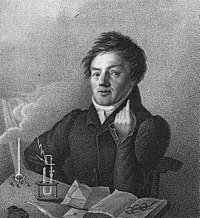Johann Wolfgang Döbereiner
Johann Wolfgang Döbereiner | |
|---|---|
 Döbereiner | |
| Born | 13 December 1780 |
| Died | 24 March 1849 (aged 68) |
| Known for | Döbereiner's triads Döbereiner's lamp |
| Scientific career | |
| Fields | Chemistry |
| Institutions | University of Jena |
Johann Wolfgang Döbereiner (13 December 1780 – 24 March 1849) was a German chemist who is known best for work that was suggestive of the periodic law for the chemical elements, and for inventing the first lighter, which was known as the Döbereiner's lamp.[1] He became a professor of chemistry and pharmacy for the University of Jena.
Life and work
As a coachman's son, Döbereiner had little opportunity for formal schooling. Thus, he was apprenticed to an apothecary, and began to read widely and to attend science lectures. He eventually became a professor for the University of Jena in 1810 and also studied chemistry at Strasbourg. In work published during 1829,[2] Döbereiner reported trends in certain properties of selected groups of elements. For example, the average of the atomic masses of lithium and potassium was close to the atomic mass of sodium. A similar pattern was found with calcium, strontium, and barium; with sulfur, selenium, tellurium; and with chlorine, bromine, and iodine. Moreover, the densities for some of these triads had a similar pattern. These sets of elements became known as "Döbereiner's triads".[3][4]

Döbereiner is also known for his discovery of furfural,[5] for his work concerning the use of platinum as a catalyst, and for the invention of a lighter, known as Döbereiner's lamp.[6] By 1828 hundreds of thousands of these lighters had been mass produced by the German manufacturer Gottfried Piegler in Schleiz.[7]
The German writer Goethe was a friend of Döbereiner, attended his lectures weekly, and used his theories of chemical affinities as a basis for his famous 1809 novella Elective Affinities.
Works
- Deutsches Apothekerbuch . Vol. 1-3 . Balz, Stuttgart 1842-1848 Digital edition by the University and State Library Düsseldorf
References
- ^ "Treasures: Table lighters ignite interest in collectors". Irish Independent News. 2016-11-11. Retrieved 2017-01-27.
- ^ Döbereiner, Johann Wolfgang (1829). "Versuch zu Gruppirung der elementaren Stoffe nach ihrer Analogie" [An attempt to group elementary substances according to their analogies]. Annalen der Physik und Chemie (in German). 15 (2): 301–307. Bibcode:1829AnP....91..301D. doi:10.1002/andp.18290910217.
- English translation: Leicester, Henry M.; Klickstein, Herbert S., eds. (1952). A Source Book in Chemistry, 1400-1900. Cambridge, Massachusetts, USA: Harvard University Press. pp. 268–272. From p. 269: " … an attempt which I made twelve years ago to group substances by their analogies."
- ^ "Johann Wolfgang Dobereiner". Chemed Chemistry. Archived from the original on 2016-03-23. Retrieved 2016-03-23.
- ^ "A Historic Overview: Mendeleev and the Periodic Table" (PDF). Genesis Mission. NASA. Retrieved 2008-03-08.
- ^ J. W. Döbereiner (1832). "Ueber die medicinische und chemische Anwendung und die vortheilhafte Darstellung der Ameisensäure" [On the medical and chemical application and the profitable preparation of formic acid]. Annalen der Pharmacie. 3 (2): 141–146. doi:10.1002/jlac.18320030206. From p. 141: "Ich verbinde mit diese Bitte noch die Bemerkung, … Bittermandelöl riechende Materie enthält, … " (I join to this request also the observation that the formic acid which is formed by the simultaneous reaction of sulfuric acid and manganese peroxide with sugar and which contains a volatile material that appears oily in an isolated condition and that smells like a mixture of cassia and bitter almond oil … )
- ^ See:
- Döbereiner (1823). "Neu entdeckte merkwürdige Eigenschaften des Sub-oxyds des Platins, des oxydirten Schwefel-Platins und des metallischen Platin-Staubes" [Newly discovered remarkable properties of the suboxides of platinum, of oxidized platinum sulfide, and of metallic platinum dust]. Annalen der Physik. 1st series (in German). 74 (3): 269–273. Bibcode:1823AnP....74..269D. doi:10.1002/andp.18230740705. See also Fig. 14 on Table III.
- Döbereiner (1823). "Neu entdeckte merkwürdige Eigenschaften des Sub-oxyds des Platins, des oxydirten Schwefel-Platins und des metallischen Platin-Staubes" [Newly discovered remarkable properties of the suboxides of platinum, of oxidized platinum sulfide, and of metallic platinum dust]. Journal für Chemie und Physik (in German). 38 (7): 321–326. Bibcode:1823AnP....74..269D. doi:10.1002/andp.18230740705.
- Williams, William D. (1999). "Dobereiner's hydrogen lighter" (PDF). Bulletin for the History of Chemistry. 24: 66–68.
- Kauffman, George B. (1999). "Johann Wolfgang Dobereiner's Feuerzeug". Platinum Metals Review. 43 (3): 122–128.
- ^ Thomas, John Meurig (2017). "The RSC Faraday prize lecture of 1989". Chemical Communications. 53 (66): 9185–9197. doi:10.1039/C7CC90240A. PMID 28782762.
Further reading
- Collins, P. M. D. (1986). "The Pivotal Role of Platinum in the Discovery of Catalysis" (PDF). Platinum Metals Review. 30 (3): 141–146.
- Döbereiner, Johann Wolfgang (1829). "An Attempt to Group Elementary Substances according to Their Analogies". Annalen der Physik und Chemie. 15 (2): 301–307. Bibcode:1829AnP....91..301D. doi:10.1002/andp.18290910217.ff
- Hoffmann, Roald (Jul–Aug 1998). "Döbereiner's Lighter". American Scientist. 86 (4): 326. doi:10.1511/1998.4.326. Archived from the original on 2016-11-07. Retrieved 2014-09-10.
- Hoffmann, Roald (1998). "Döbereiner's Lighter". American Scientist. 86 (4): 326. doi:10.1511/1998.4.326. Archived from the original on March 24, 2006.
- Kauffman, George B. (1999). "Johann Wolfgang Döbereiner's Feuerzeug". Platinum Metals Review. 43 (3).
- Kaufmann, George (1999). "From Triads to Catalysis: Johann Wolfgang Döbereiner (1780–1849) on the 150th Anniversary of His Death". The Chemical Educator. 4 (5): 186–197. doi:10.1007/s00897990326a. S2CID 97696152.
- McDonald, Donald (1965). "Johann Wolfgang Döbereiner" (PDF). Platinum Metals Review. 9 (4): 136–139. Archived from the original (PDF) on 2015-09-24. Retrieved 2007-02-15.
- Prandtl, Wilhelm (1950). "Johann Wolfgang Dobereiner, Goethe's Chemical Adviser". Journal of Chemical Education. 27 (4): 176–181. Bibcode:1950JChEd..27..176P. doi:10.1021/ed027p176.
- Kimberley A. McGrath, Bridget Travers. 1999. World of Scientific Discovery. Gale Research.
- Scerri Eric. 2020, The Periodic Table: Its Story and Its Significance, 2nd edition, Oxford University Press, New York, ISBN 978-0190914363
